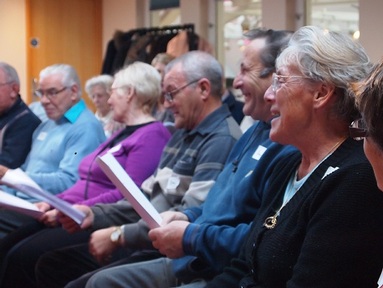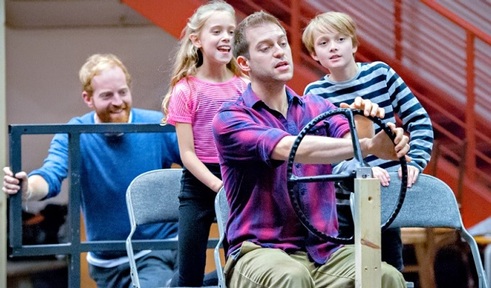Dreaming of a dementia friendly White Christmas
How do you make a theatre performance dementia friendly? Ask someone with dementia. That’s what Nicky Taylor at West Yorkshire Playhouse did to create the award-winning play White Christmas, which has attracted a new audience of theatre-goers. 
West Yorkshire Playhouse scooped the best dementia friendly project award with the play at the Alzheimer's Society's Dementia Friendly Awards this year.
The musical triggered requests for more productions from a growing audience of new fans living with dementia and interest from theatre directors wishing to learn from and emulate its success. But what made Nicky Taylor, the playhouse’s community development manager put on a dementia friendly play?
She says the performances evolved from the playhouse’s activities with older people.
Every week, 300 older people participate in the playhouse’s ‘Heydays’ programme of creative activities which include painting, sculpting, singing and other arts.
“I noticed that people were experiencing changes with memory and began to lose confidence. They were struggling to come along to Heydays,” she explains.
As a result, Nicky Taylor started running creative sessions for those with dementia and their partners and found the spark of romance was rekindled in people’s relationships.
"When you’re caring for someone it’s very easy to just see the tasks needed to get through each day. The beauty of the arts is, it offers a level playing field. The arts is all about expression of creativity.There is no right or wrong answer.
“Partners who are carer and cared for suddenly become equal. It’s a great leveller. You can absolutely see the moments of joy. People surprise each other.”
As part of these projects, Nicky Taylor took the couples to see the playhouse’s shows.
“It was just incredibly clear how much of a connection was made during those experiences. People were really engaged and alert.”
Nicky Taylor’s decision to go a step further and create a dementia-friendly play was inspired by feedback from the couples. But this leap of faith required the whole team’s support. She explains: “There are two aspects to it. Preparing the front of house experience and preparing the show.
Actors
“We work with the actors to raise their awareness of what it’s like to live with dementia. Giving insight into changes people experience and how they might perceive that environment, helps actors prepare."
All the cast, crew and volunteers are trained up as Dementia Friends.
Lighting
White Christmas, the theatre’s first dementia friendly show performed in December 2014, is a musical about friendship. Two US soldiers reunite post-war to support their old general as he struggles to save his business.
The opening scene of White Christmas unleashes sounds that make the audience feel like they are on a battle ground in the Second World War and the team had to sit down and rethink it.
"It was specifically created to unsettle and raise tension. Obviously we had to look at that because the key moment for people to settle into an environment and to feel comfortable is based on the initial impression.”
Nicky Taylor kept the opening battle scene but flashes from explosions going off were removed and the sound was reduced “to make it less aggressive”.
She explains, “A lot of this is very subtle and the idea is that we don’t change the overall feel of the play. It’s about making very subtle tweaks, so that people can get the same experience as anyone else would coming to see a play. It’s about just making a few adaptations that will make people more comfortable in that environment.”
The playhouse consults with members of Educate, a dementia empowerment group run by people in the early stages of the condition, who attend dress rehearsals and previews to give feedback.
Pre-show singing

Before seeing the play, individuals with dementia visited Leeds’ Tea Cosy Memory Café to sing music from the production to help them connect with the show.
Seating and ‘human signage’
Staff at the playhouse set up a ‘quiet room’, which is manned throughout. Those with dementia could request that a seat next to them not be sold, to make them feel more relaxed.
Playhouse employees and 40 volunteers from a local college acted as ‘human signage’ to help people navigate around the space. Different routes were opened up in the theatre to give people a shorter walk to their seats. Chairs were even placed along the route to allow people to rest. Theatre-goers could be greeted at the car park by volunteers who waited at the entrance with them, while family members/carers parked.
Refreshment
Tables can be reserved and café staff avoid any contrast of plates and cups on serving trays to help those with visuospatial perception issues. Volunteers carried trays and ice creams were served to people in their seats by local primary school children.
After the show, the audience met the cast and, for those who struggle to make verbal conversation, could touch the tactile fabric of the actor’s costumes to get them interacting with actors.
Audience response
“Actors feel ‘a special connection with their audience’. Any compromises made have been compensated for by the warmth of reception from the audience. When we proposed this, we had no idea what the outcome would be and we worried not many people would come.”
Despite their doubts, some 400 people attended the first performance. Care home staff, home care workers and carers were also in the audience.
“Seeing care staff and the people they care for in a different environment enjoying the theatre together is very moving. For some it has enabled family members to accompany their relative to the theatre for the first time in years.”
White Christmas was followed last July by the play ‘Beryl’, which tells the story of a female world champion cyclist from Yorkshire.

Visuospatial Perception
Based on a real story with archive press footage, she says: “the feedback we received was the footage was quite grainy and difficult to make out for people with visuospatial perception issues. So we tried to increase the brightness of that projection”.
Sound Effects
“There were lots of starter pistols and gunshots to start races that were a bit unsettling for people, so we removed some of those or lessened the sound effects.”
Spreading the dementia friendly message is something Nicky Taylor is passionate about. More pre-show sing-alongs are being planned in care homes across the UK.
She is also giving talks to the arts world about dementia friendly plays. This year, Beryl has been on a national tour of theatres. Nicky Taylor is also working on an online guide for dementia friendly theatre performances.
She is currently working with the Millennium Forum in Derry to produce the pantomime Aladdin in December and is collaborating with Curve in Leicester to deliver a dementia friendly production of Oliver in January. It is directed by White Christmas director Nikolai Foster.
“Many theatres are so well set up to work with people in a creative way that it’s natural that people with dementia should be part of that picture.”

This Christmas, the playhouse will host Chitty Chitty Bang Bang with a dementia friendly show on 19 January.
With thoughts turning to the year ahead, Nicky Taylor adds: “Dementia is everyone’s responsibility these days. It’s about subtle changes that theatres can do, to make people feel welcome.”
Latest Features News
 25-Nov-19
2019 Election: Boris Johnson leaves social care in 'too difficult box' but Labour vows to end 'crisis'
25-Nov-19
2019 Election: Boris Johnson leaves social care in 'too difficult box' but Labour vows to end 'crisis'
 18-Oct-19
Podcast: Wendy Mitchell and dementia: 'My biggest fear is not knowing who my daughters are'
18-Oct-19
Podcast: Wendy Mitchell and dementia: 'My biggest fear is not knowing who my daughters are'
 27-Sep-19
Exclusive: Care minister backs care workers' call for time off to grieve and attend funerals
27-Sep-19
Exclusive: Care minister backs care workers' call for time off to grieve and attend funerals
 19-Sep-19
Podcast: Gyles Brandreth says poetry helps ward off dementia
19-Sep-19
Podcast: Gyles Brandreth says poetry helps ward off dementia
 30-Aug-19
Edinburgh Fringe funnyman joins comics facing toughest audience at care home gig
30-Aug-19
Edinburgh Fringe funnyman joins comics facing toughest audience at care home gig